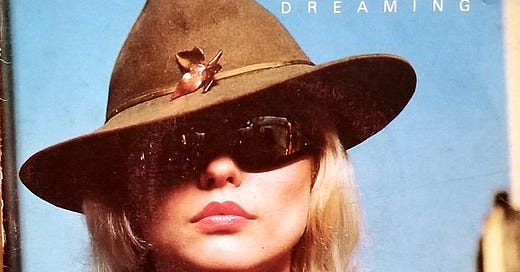My social media feeds today have been wall-to-wall photos and memories of Clem Burke, given the sad news that the drummer has died from cancer at age 70. Clem was known for powering Blondie, of course, but his musical c.v. was extensive. For example, some years ago I saw Clem drumming for garage-rock revivalists the Split Squad at the Beachland Ballroom. It was mind-blowing to see him in a club; the relatively small space could barely contain his forceful playing.
Clem steered Blondie in multiple directions: disco, punk, reggae, rock, electro, pop. But after news of his death, the song I saw cited frequently by fans was “Dreaming,” the first track on 1979’s Eat to the Beat. It’s one of my favorites, all girl-group harmonic shimmer, power pop verve, and youthful idealism—a song that winks at retro sounds while remaining firmly contemporary.
Debbie Harry’s vocals perfectly capture the giddy freedom of that era between adolescence and young adulthood, when life’s possibilities come into focus. She gives the protagonist—and all of us listeners—permission to wish for bigger and better things: Dreaming is free.
Lyrically, I hear “Dreaming” as an answer song to Tom Petty & the Heartbreakers’ “American Girl,” written from the perspective of the latter tune’s main character. Instead of being paralyzed by her past, the American Girl of “Dreaming” is seizing control of her future and her own narrative. In fact, she’s determined to create her own exciting life on her own terms: Imagine something of your very own/Something you can have and hold.
Naturally, this protagonist isn’t a passive recipient of anything, much less someone’s flirtation:
When I met you in the restaurant
You could tell I was no débutante
You asked me what's my pleasure
A movie or a measure
Her response to this question? To assert her agency: I'll have a cup of tea/And tell you of my dreaming.
But the brilliance of “Dreaming,” of course,” also comes from Clem’s drumming. He ushers in the song with a flurry of pounding beats, telegraphing the buoyant optimism of the narrator. And then throughout, he keeps a steady groove that anchors the song and keeps the hopeful vibe at the forefront.
But Clem never stays in the same place for very long: He throws out crisp drum fills, sudden flourishes, some sped-up Hal Blaine syncopation, maybe a twirling drum toss. In the hands of another drummer, the performance might come across as ostentatious; instead, Clem made even the showiest moments look and sound like all in a casual day’s work.
Fittingly, Clem once said that was exactly what it was:
That take of “Dreaming” was just me kind of blowing through the song. It's not like I expected that to be the take. I was consciously overplaying just for the sake of it because it was a run-through.
Today, it’s extra poignant to me that Blondie have ended their recent sets with “Dreaming.” The song is a reminder to never let self-imposed limitations crater your ambitions. But it’s also reminder to stay hopeful and grounded, because wishing for better things—and better days—matters wherever you are in life.
R.I.P. Clem Burke. Dreaming is free.




Beautiful writing. Clem was the greatest<3 <3 <3
Well done. Thanks.